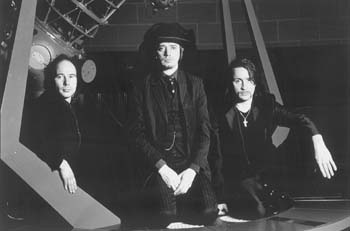![[Metroactive Music]](/music/gifs/music468.gif)
[ Music Index | Metro | Metroactive Central | Archives ]
Motor Music Machine
 Strategies Against Euphony: The industrial world falls into cacophony in the hands of Einstürzende Neubauten. Germany's Einstürzende Neubauten writes a 'New Ending' to industrial-rock movement By Gina Arnold PSYCHOLOGISTS WHO help athletes achieve a competitive edge would be proud of the swimmers of Cal State Bakersfield. This year, their team T-shirts carry the intimidating message "Whatever doesn't kill you, makes you strong"--in German. The phrase reinforces the belief that anything uttered in German is automatically more forceful. The truth is, the German language has had a bad rap since well before World War II. Indeed, as far back as the mid-16th century, the Holy Roman Emperor Charles V is said to have declared, "I speak Spanish to God, Italian to women, French to men and German to my horse." It took until the latter part of the 20th century for the language's innate lack of euphony to find a better use--in the rock & roll arena. Bands like Kraftwerk, Faust and, more recently, Rammstein have all used German's harsh glottal stops to heighten the spooky or menacing nature of their message. Both Peter Gabriel and David Bowie have been known to sing their songs in German, for much the same reason. When it comes to the semiotics of rock, however, Einstürzende Neubauten is the master of them all. Not only is the band adept at using German to its best semantic advantage, but its groundbreaking oeuvre has provided a blueprint from which numerous bands--Sonic Youth, Ministry, Nine Inch Nails--have taken their entire inspiration. As far back as 1981, Einstürzende Neubauten (the name means "collapsing new buildings") was using found objects--particularly power tools--as musical instruments. (So, it must be admitted, did Faust, years earlier.) Now that sampling is a universal conceit, such rhythmic tricks are run of the mill--indeed, they can now be seen on Broadway in the popular dance musical Stomp--but it was a transformational idea at the time. Although they were innovative, however, E.N.'s records--Kollaps, Strategies Against Architecture, etc.--were almost unlistenable paeans to white noise, which may be why more commercial versions of the idea (by the aforementioned Ministry and Sonic Youth) are better loved. But live, E.N. was always amazing: louder, more sinister, more innately arty and bizarre than any subsequent incarnation of its sound could ever muster. Moreover, leader Blixa Bargeld is one of the scarier, more theatrical presences in rock, a gaunt and intense musical heretic who went on to play with Nick Cave and the Bad Seeds. Bargeld is the human embodiment of the world-weary Berliner artiste that has dogged our imaginations since Christopher Isherwood first wrote Prater Violet in the 1930s. He is everything Marilyn Manson isn't: an inspired conceptual artist whose music is monumentally compelling. Ende Neu ("new ending") is the band's 11th album, and it is a surprisingly delicate record, one that shows a real leap in listenability. This evolution is obvious from the first track, "Was Ist Ist." The chorus--"Was ist ist, was nich ist ist möglich/nur was nicht ist ist möglich" ("What is is, what is not is possible/just what is not is possible")--sounds like a play on President Clinton's recent declaration to the grand jury that his answer "depends on what your definition of 'is' is." EVEN BETTER is the ballad "Stella Maris," a beautiful and amazingly tuneful duet with German actress Meret Becker that would fit beautifully on a Marianne Faithfull record. Its chorus--"Du tramst mich ich dich/keine Angst ich finde dich"--positively sticks in the head. Bargeld, alas, does not have a great or powerful voice. One expects the scary basso profundo of Nick Cave or Till Lindemann, the singer of Rammstein, but one gets a reedy tenor instead. In German, however, the words sound sibilant and spooky. It certainly elevates the impact of music that could otherwise fall through the cracks of the industrial-dance genre. Though listenable, Ende Nue is not a commercial work. It is too poetic and strange for that. Besides, E.N. has always been a high concept. The point of using power tools as percussion instruments was to make a statement about the alienating nature of life in the modern age, and that aspect of the band's music has not changed in the least. "NNNAAMMM" ("New No New Age Advanced Ambient Motor Music Machine") is a 10-minute long disco song that samples, among other things, Renault and Alfa Romeo engines, a steam compressor and a power station in the town of Spa, France. The great irony of the band's Germanicness, however, is that this type of music is no more popular in Germany than it is here. Indeed, it is less so, judging by the television show Big in Germany (which can be seen on some local cable systems on Sunday nights on Ch. 32). At least America allows the likes of Beck, R.E.M. and Rob Zombie into our midst. But as seen Big in Germany, the German Top 20 invariably consists of countless songs by terrible disco bands--plus the latest singles by Madonna, Celine Dion and (for some inexplicable reason) Busta Rhymes. Apparently, the image of German artists as pale, pretentious and dour is not as prevalent as the Saturday Night Live skit "Sprockets" would have us believe. Einstürzende Neubauten deserves more credit for integrating rock music with more intellectually stimulating ideas--and for making the German language sound good.
Einstürzende Neubauten appears Wednesday (Dec. 9) at 8pm at the Warfield, 982 Market St., San Francisco. Tickets are $20/$22.50. (BASS) [ San Jose | Metroactive Central | Archives ]
|
From the December 3-9, 1998 issue of Metro.
Copyright © Metro Publishing Inc. Maintained by Boulevards New Media.